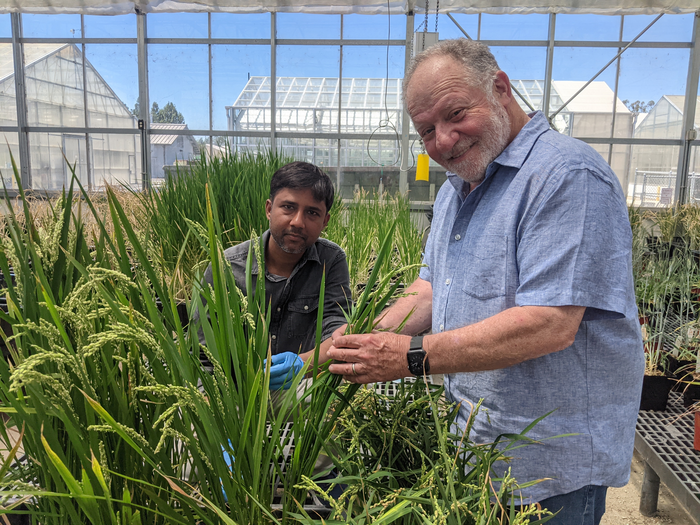Researchers at the University of California, Davis, have found a way to reduce the amount of nitrogen fertilizers needed to grow cereal crops. The discovery could save farmers in the United States billions of dollars annually in fertilizer costs while also benefiting the environment.

Credit: (Trina Kleist/UC Davis)
Researchers at the University of California, Davis, have found a way to reduce the amount of nitrogen fertilizers needed to grow cereal crops. The discovery could save farmers in the United States billions of dollars annually in fertilizer costs while also benefiting the environment.
The research comes out of the lab of Eduardo Blumwald, a distinguished professor of plant sciences, who has found a new pathway for cereals to capture the nitrogen they need to grow.
The discovery could also help the environment by reducing nitrogen pollution, which can lead to contaminated water resources, increased greenhouse gas emissions and human health issues. The study was published in the journal Plant Biotechnology.
Nitrogen is key to plant growth, and agricultural operations depend on chemical fertilizers to increase productivity. But much of what is applied is lost, leaching into soils and groundwater. Blumwald’s research could create a sustainable alternative.
“Nitrogen fertilizers are very, very expensive,” Blumwald said. “Anything you can do to eliminate that cost is important. The problem is money on one side, but there are also the harmful effects of nitrogen on the environment.”
A new pathway to natural fertilizer
Blumwald’s research centers on increasing the conversion of nitrogen gas in the air into ammonium by soil bacteria — a process known as nitrogen fixation.
Legumes such as peanuts and soybeans have root nodules that can use nitrogen-fixing bacteria to provide ammonium to the plants. Cereal plants like rice and wheat don’t have that capability and must rely on taking in inorganic nitrogen, such as ammonia and nitrate, from fertilizers in the soil.
“If a plant can produce chemicals that make soil bacteria fix atmospheric nitrogen gas, we could modify the plants to produce more of these chemicals,” Blumwald said. “These chemicals will induce soil bacterial nitrogen fixation and the plants will use the ammonium formed, reducing the amount of fertilizer used.”
Blumwald’s team used chemical screening and genomics to identify compounds in rice plants that enhanced the nitrogen-fixing activity of the bacteria.
Then they identified the pathways generating the chemicals and used gene editing technology to increase the production of compounds that stimulated the formation of biofilms. Those biofilms contain bacteria that enhanced nitrogen conversion. As a result, nitrogen-fixing activity of the bacteria increased, as did the amount of ammonium in the soil for the plants.
“Plants are incredible chemical factories,” he said. “What this could do is provide a sustainable alternative agricultural practice that reduces the use of excessive nitrogen fertilizers.”
The pathway could also be used by other plants. A patent application on the technique has been filed by the University of California and is pending.
Dawei Yan, Hiromi Tajima, Howard-Yana Shapiro, Reedmond Fong and Javier Ottaviani from UC Davis contributed to the research paper, as did Lauren Cline from Bayer Crop Science. Ottaviani is also a research associate at Mars Edge.
The research was funded by the Will W. Lester Endowment. Bayer Crop Science is supporting further research on the topic.
Journal
Plant Biotechnology
DOI
10.1111/pbi.13894
Method of Research
Experimental study
Subject of Research
Cells
Article Title
Genetic modification of flavone biosynthesis in rice enhances biofilm formation of soil diazotrophic bacteria and biological nitrogen fixation
Article Publication Date
4-Aug-2022
COI Statement
The authors declare that the research was conducted in the absence of any commercial or financial relationships that could be construed as a potential conflict of interest. The University of California, Davis has applied for patents related to the work in this article.




